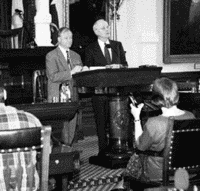A 21st-century solution is needed for how Texas government works
June 1, 2007
Fellow Texans, hasn't the time come to remake our state government so that it can more effectively deal with our 21st-century reality? Is it any wonder that in the 131 years since our Constitution was adopted, 619 amendments have been proposed to it and 440 have been adopted?
Written by Carlos Guerra, San Antonio Express-News

At podium, Senator Bill Ratliff of Mount Pleasant (right) and Representative Rob Junell of San Angelo (left) field questions from reporters on a newly proposed rewrite of Texas' constitution, Dec. 4, 1998.
Fellow Texans, hasn't the time come to remake our state government so that it can more effectively deal with our 21st-century reality?
For most of the 30-odd years since Texas allowed me to cast ballots, I have gone into voting booths with a pretty good idea about who I wanted to vote for and against. But every couple of years, I have also been confounded by questions about some pretty obscure aspects of our state's Constitution.
More than once, the choices have bordered on the ridiculous. Was it really necessary, I have asked myself, for Texas' voters to decide if one of the state's 254 counties should abolish its county treasurer's post or fire its county surveyor?
Let's face it. Our current Texas Constitution isn't exactly an inspired document worthy of being graven in granite.
In fact, when it went into effect in 1876, it wasn't even Texas' first charter.
In 1836, the Republic of Texas ratified the first constitution, which understandably, was replaced by a state constitution when Texas joined the Union in 1845. And it didn't stop there.
In 1861, when Texas joined the Confederacy, it got yet another constitution, that five years later was replaced when the Confederacy bit the dust.
That one was only in effect for three years, however, because in 1869, the Lone Star State got its fifth charter — and kept it for all of seven years, when it was supplanted by the hodge-podge Constitution we have today.
The current document is, by any measure, a piece of work. And it has never stopped changing, in large part, because it is overly specific, and more about what state government cannot do than what it can.
Suspicious of government in general, the framers of the constitution fragmented the powers of the executive among the governor, lieutenant governor, comptroller of public accounts, commissioner of the general land office and attorney general, all of whom are elected independently of each other.
Unlike the president, who has broad powers of appointment, Texas' governor appoints only the secretary of state and some agency heads. And unlike Congress, our legislature has no real confirmation powers because it is so seldom in session.
Like Congress, Texas' legislative branch is split into a House and Senate. But our lawmakers can legislate only during a 140-day period every two years, unless they are convened in special session by the governor, who then dictates what issues they can address.
Unlike federal judges, our entire judicial branch is popularly elected. But it too is fragmented, and effectively headed by two "supreme courts," the Texas Supreme Court and the Court of Criminal Appeals.
Perhaps the biggest flaw in the Texas Constitution, however, is that unlike its federal counterpart, it does not include a "necessary and proper" clause.
Instead, state powers are limited to those that are specifically detailed in a document that has now grown into 66 sections and 62 subsections — though 19 of these have since been repealed.
For reasons no one I consulted could explain, the Texas Constitution even includes a "blank section."
The specificity of what is still included is astounding, however.
Article 1, the "Bill of Rights," for example, originally had 29 sections that included the U.S. Constitution's Bill of Rights, but in language that is much wordier and specific, and in some places, was modified.
Texas office holders, for example, are specifically protected from any religious test — so long as they "acknowledge the existence of a Supreme Being."
Is it any wonder that in the 131 years since our Constitution was adopted, 619 amendments have been proposed to it and 440 have been adopted?
Isn't it time to scrap the whole thing and start from scratch? Shouldn't Texas have a more unified executive branch that is balanced by a full-time legislature and a judiciary that is more about the rule of law than about electoral politics?
![]()
![]()
Related Stories
![]()
Fair Use Notice
This site contains copyrighted material the use of which has not always been specifically authorized by the copyright owner. We are making such material available in our efforts to advance understanding of environmental, political, human rights, economic, democracy, scientific, and social justice issues, etc. We believe this constitutes a "fair use" of any such copyrighted material as provided for in section 107 of the US Copyright Law. In accordance with Title 17 U.S.C. Section 107, the material on this site is distributed without profit to those who have expressed a prior interest in receiving the included information for research and educational purposes. For more information go to: http://www.law.cornell.edu/uscode/17/107.shtml. If you wish to use copyrighted material from this site for purposes of your own that go beyond "fair use", you must obtain permission from the copyright owner.